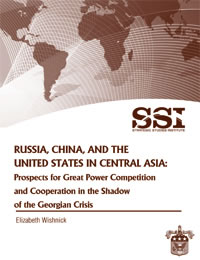Russia, China, and the United States in Central Asia: Prospects for Great Power Competition and Cooperation in the Shadow of the Georgian Crisis

Authored by Dr. Elizabeth Wishnick.
February 2009
73 Pages
Brief Synopsis
Russia and China have been reacting to the pressures of changing U.S.-Central Asia policy over the past 5 years as has the United States. In response to the “color” revolutions, they achieved broad agreement on the priority of regime security and the need to limit the long-term military presence of the United States in Central Asia. These are also two key areas—defining the political path of Central Asian states and securing a strategic foothold in the region—where the United States finds itself in competition with Russia and China.
The Russia-China partnership should not be seen as an anti-U.S. bloc, nor should the Shanghai Cooperation Organization (SCO) be viewed as entirely cohesive. Although there is considerable suspicion of U.S. designs on Central Asia, divergent interests within the SCO, among Central Asian states, and especially between Russia and China serve to limit any coordinated anti-U.S. activity.
Despite the fissures within the SCO and the competitive tendencies within the Sino-Russian partnership, the United States will not have an easy time achieving its aims in Central Asia. The author documents how American policy goals—energy cooperation, regional security, and support for democracy and the rule of law—continue to run at cross-purposes with one another.
In particular, she asserts that competition to secure basing arrangements and energy contracts only benefits authoritarian regimes at the expense of enduring regional security. She argues further that the rhetoric about a new Cold War in the aftermath of the Georgian crisis, and the more general tendency to view U.S.-Russia-China competition in the region with 19th century lenses, as some sort of “new great game,” obscures the common interests the great powers share in addressing transnational problems in Central Asia.
Summary
This monograph explores the appearance and reality of a consolidation of anti-U.S. interests in Central Asia via the Shanghai Cooperation Organization (SCO) and the Sino-Russian partnership. The author asserts that while there is considerable suspicion of U.S. designs on Central Asia, divergent interests within the SCO, among Central Asian states, and especially between Russia and China, serve to limit any coordinated anti-U.S. activity.
The monograph takes a critical look at the Sino-Russian partnership and points to differences on energy and economic integration in Central Asia, despite common interests in maintaining regime security and limiting U.S. influence in the region. A section on the implications of the Georgian crisis shows how this war highlighted the divergence in Russian and Chinese interests, while accentuating the vulnerability of the Central Asian states to Russian influence, and underlining the risks involved in U.S. energy projects in the region.
The monograph then addresses the policy implications for the United States of the shifting regional picture in Central Asia. Despite the fissures within the SCO and the competitive tendencies within the Sino-Russian partnership, the monograph asserts that United States will not have an easy time achieving its aims in Central Asia. American policy goals—energy cooperation, regional security, and support for democracy and the rule of law—often conflict with one another. Declining assistance also leaves the United States with fewer effective policy instruments to recoup its declining influence among Central Asian publics, address underlying conditions which lead to regional instability, and press for accountable governments that have the capacity to address the growing range of transnational threats to the region. The author presents policy recommendations in a concluding section. She notes that, despite the general tendency to highlight the clashing interests among the great powers in Central Asia, the United States also faces many opportunities for multilateral cooperation due the increasing primacy of transnational threats.
Access Full Report [PDF]: Russia, China, and the United States in Central Asia: Prospects for Great Power Competition and Cooperation in the Shadow of the Georgian Crisis
|
NEWSLETTER
|
| Join the GlobalSecurity.org mailing list |
|
|
|

